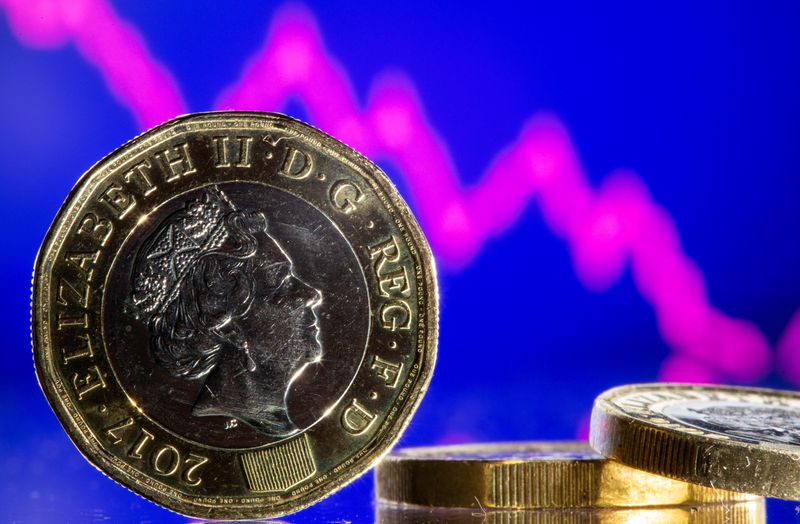By Lucy Raitano
LONDON (Reuters) - Sterling rallied on Thursday and investors reined in their bets on a big Bank of England interest rate hike in November as UK Prime Minister Liz Truss announced her resignation just six weeks after she was appointed.
Truss' economic programme had sent shockwaves through the markets and divided her Conservative Party, contributing to a sharp a selloff in UK assets.
Pressure on the prime minister had been mounting in recent days and a leadership election will be completed within the next week.
The pound, which had rallied ahead of Thursday's news, was last up 0.74% at $1.13060. It edged 0.17% higher against the euro to around 86.970 pence, moving off a one-week low touched earlier.
"Initially, this is likely to take an uncertainty premium out of the market but it depends who takes over. You need a steady hand at the top," said Viraj Patel, global macro strategist at Vanda Research.
CALMER TIMES?
Truss' resignation came a day after a second top minister quit and rowing and jostling broke out among her lawmakers in parliament.
Her premiership has witnessed a bond market rout and a U-turn on almost all of her fiscal policy programme. Wednesday saw Truss lose her interior minister, less than a week after she fired her finance minister.
But a semblance of calm has surfaced in markets and Britain's five-year credit default swaps (CDS) - instruments used to hedge against a default - eased on Thursday to 38 basis points (bps) after closing at 40 bps on Wednesday, data from S&P Global (NYSE:SPGI) Market Intelligence showed. UK CDS had been indicated as high as 47 bps in late September.
Rating agencies S&P and Moody's review UK sovereign ratings on Friday.
Britain's mid cap share index briefly jumped 1% as Truss spoke and last traded up 0.6%, while UK blue chips were a touch higher on the day.
Expectations for an aggressive 100 bps rate hike at the Bank of England's November meeting have also been dialled back.
Rate futures markets pointed to an 8% chance of a 100 basis-point rate increase at the BoE's Nov. 3 meeting, down from around 25% at the start of the day. There is now a 92% chance of a 75 bps hike, according to Refinitiv calculations.
Earlier on Thursday the BoE's Ben Broadbent said the central bank was poised to respond to changes in Britain's tax and spending policies but it remained to be seen if interest rates would go up as much as investors have been expecting.

"If you've got someone who looked like they were going to create stability, and in effect deliver the Hunt fiscal plan, I think this means the peak in (interest) rates will be lower than we've got priced in," said Societe Generale (EPA:SOGN)'s Kit Juckes, referring to new finance minister Jeremy Hunt.
"I still think sterling will go down, not up, because rates won't go as high as traders expect, but I think you've probably already seen the low in cable (sterling/dollar)."